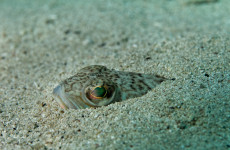Top Stories
Urgent Warning: Venomous Weever Fish Threatens Irish Swimmers

URGENT UPDATE: Irish swimmers are facing an immediate threat from the venomous weever fish, which is lurking in sandy waters along the Irish coastline. Recent warnings have been issued as this fish, often buried in the sand with only its fin visible, can deliver a painful sting that “ruins” a beach day for unsuspecting bathers.
Reports indicate that stings from the weever fish can cause severe pain, swelling, and numbness, with symptoms peaking within the first two hours and potentially lasting over 24 hours. While typically non-life-threatening, severe reactions may lead to anaphylactic shock.
In a shocking incident, Méabh Delaney was stung while enjoying a beach day in Kerry. “I felt a weird sensation in my leg and foot,” she recounted. Thankfully, she was with a lifeguard who immediately recognized the sting and rushed her to safety. “The lifeguard said he has seen grown men cry from the sting,” Delaney added.
According to Roger Sweeney, deputy CEO of Irish Water Safety, weever fish are prevalent around the Irish coast, especially between May and September when water temperatures rise. “They’re very small, but they’re venomous,” Sweeney warned, emphasizing that a sting can lead to intense discomfort.
To prevent these painful encounters, swimmers are advised to stay clear of the beach during the two hours before and after low tide, as weever fish thrive in warm, shallow waters. Sweeney recommends wearing foot protection and shuffling feet while walking on the sand to disturb the fish.
If stung, immediate action is crucial. Bathers should consult a lifeguard and immerse the affected foot in water as hot as can be tolerated, ideally up to 40 degrees Celsius, for a minimum of 90 minutes. This heat helps break down the venom. “The longer you leave it, the worse it gets,” Sweeney cautioned.
Patients experiencing numbness should be aware of the risk of burns from hot water. It’s advised to place both feet in the water to gauge the temperature safely. Cold compresses are not recommended, as they can exacerbate the pain. The National Poisons Information Centre suggests taking paracetamol for pain relief and provides a helpline at 01 8092166 for further assistance.
As the summer heat continues, staying informed and vigilant is essential for all beachgoers. Share this urgent warning to keep friends and family safe from the hidden hazards of summer swimming.
-

 Top Stories3 months ago
Top Stories3 months agoTributes Surge for 9-Year-Old Leon Briody After Cancer Battle
-

 Entertainment4 months ago
Entertainment4 months agoAimee Osbourne Joins Family for Emotional Tribute to Ozzy
-

 Politics4 months ago
Politics4 months agoDanny Healy-Rae Considers Complaint After Altercation with Garda
-

 Top Stories4 months ago
Top Stories4 months agoIreland Enjoys Summer Heat as Hurricane Erin Approaches Atlantic
-

 World5 months ago
World5 months agoHawaii Commemorates 80 Years Since Hiroshima Bombing with Ceremony
-

 Top Stories3 months ago
Top Stories3 months agoNewcastle West Woman Patricia Foley Found Safe After Urgent Search
-

 Top Stories5 months ago
Top Stories5 months agoFianna Fáil TDs Urgently Consider Maire Geoghegan-Quinn for Presidency
-

 World5 months ago
World5 months agoCouple Convicted of Murdering Two-Year-Old Grandson in Wales
-

 World5 months ago
World5 months agoGaza Aid Distribution Tragedy: 20 Killed Amid Ongoing Violence
-

 World5 months ago
World5 months agoAristocrat Constance Marten and Partner Convicted of Infant Murder
-

 Top Stories4 months ago
Top Stories4 months agoClimbing Errigal: A Must-Do Summer Adventure in Donegal
-

 Top Stories4 months ago
Top Stories4 months agoHike Donegal’s Errigal Mountain NOW for Unforgettable Summer Views









